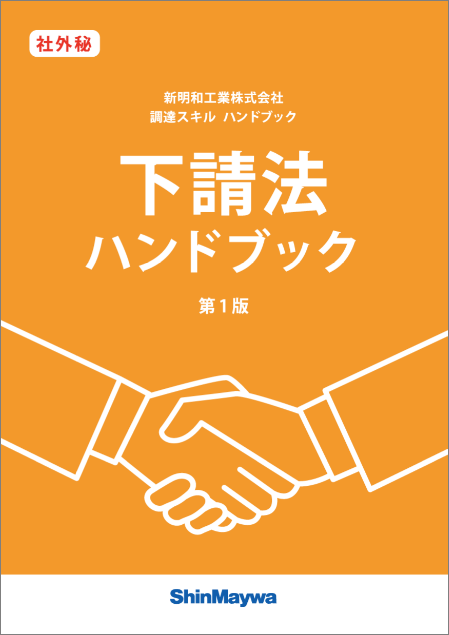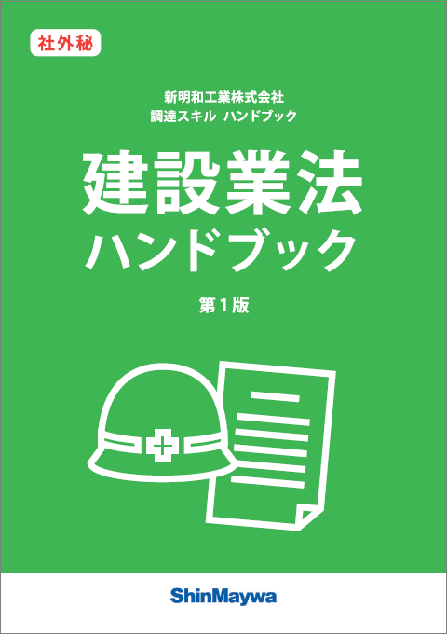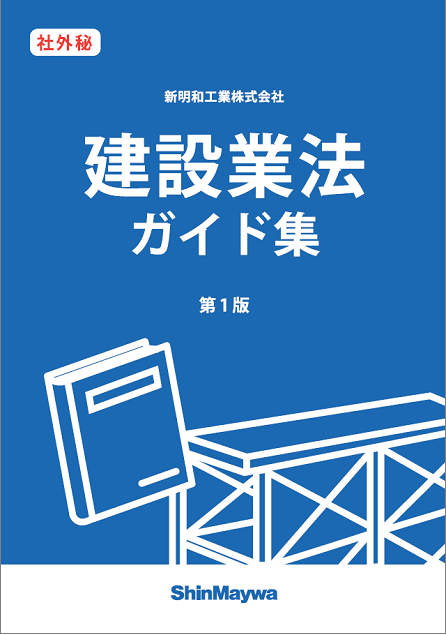CSR/Sustainable procurement
The ShinMaywa Group works closely with its business partners in a fair and sound environment to create a sustainable society together.
CSR Procurement Guidelines
- "ShinMaywa CSR Procurement Guidelines" (Japanese) [PDF:1.5MB]
- "ShinMaywa CSR Procurement Guidelines" (English) [PDF:788KB]
- "ShinMaywa CSR Procurement Guidelines" (Simplified Chinese) [PDF: 841KB]
- "ShinMaywa CSR Procurement Guidelines" (Traditional Chinese) [PDF: 857KB]
- "ShinMaywa CSR Procurement Guidelines" (Korean) [PDF:716KB]
- "ShinMaywa CSR Procurement Guidelines" (Thai) [PDF:1.08MB]
Partnership Building Declaration
CSR Procurement Policy
- 1.Partnerships
We value trust and will deepen mutual understanding based on better partnerships with all our business partners. - 2.Open doors
Whether in Japan or overseas, we conduct the best transactions based on the principle of free competition. - 3.Maintaining fair business relationships
We always deal fairly and equitably with all of our business partners. - 4.Choosing business partners
We choose our business partners through appropriate procedures based on quality, cost, and delivery (QCD) and CSR evaluations of factors including quality, delivery, and price of materials; management reliability and technological development capabilities; and environmental friendliness. - 5.Providing information and maintaining confidentiality
We respond to the requests of our business partners in good faith and provide them with the information necessary to conduct business with us. At the same time, we ask for useful information from our business partners, and securely manage any trade secrets provided to us, striving to maintain confidentiality.
Conflict Minerals Procurement Policy
- 1.The ShinMaywa Group does not use “Conflict Minerals" (such as Tin, Tantalum, Tungsten, and Gold) that may be involved in illegal activities, including serious human rights violations, corruption, and environmental destruction, which are mined from conflict regions, in the development, manufacturing, or products of our company.
- 2. In the procurement of the relevant "minerals" and products containing them, we will ensure that there is no involvement of armed groups or criminal organizations in the procurement routes, and we will strive to comply with applicable laws and international standards.
- 3.We will conduct investigations into the countries of origin of minerals and smelters/refineries by utilizing international tools such as the CMRT (Conflict Minerals Reporting Template) from the Responsible Minerals Initiative (RMI). Through these efforts, we will promote CSR procurement with the cooperation of our business partners.
CSR/Sustainable Procurement Standards
- 1.Strict adherence to corporate ethics
We understand and comply with the content and trends of laws and regulations applicable to the Company and the spirit of those laws and regulations (observance of laws). We also explicitly understand our Clean Procurement Declaration, which states that we will not provide or accept entertainment, gifts, or money to or from interested parties. - 2.Rejection of antisocial forces
We have no contact with antisocial forces, whether through personal relations of employees or organizational connections. - 3.Ensuring information security
We identify and securely manage confidential and personal information that must be protected. - 4.Quality assurance
We have built an internal environment where the safety of products, merchandise, and services is the top priority. Employees maintain this stance from day to day, and investigate if someone spots anything amiss. - 5.Information disclosure
We manage information that should be disclosed separately from information that should be kept confidential. - 6.Respect for human rights
We have a system in place for carrying out measures to prevent human rights violations and harassment, and for facilitating reporting and consultation. - 7.Creating a safe work environment
We have built an internal environment where health and safety are top priorities in our work environment as well. Employees maintain this stance from day to day, and investigate if someone spots anything amiss. - 8.Thorough risk management and training
We conduct in-house training for avoiding violation of laws and regulations, and we regularly check our compliance status. - 9.Contributing to the local community
We contribute to the local community with an awareness of mutual coexistence, through activities such as neighborhood cleanups by employees. - 10.Reducing our environmental impact
We carry out specific environmentally friendly initiatives, addressing issues such as global warming, pollutants, and protection of the natural environment.
New Supplier Evaluation Procedures and Activity Evaluation
- 1Potential business partners
New business partners are asked to submit such necessary documents as a supplier survey form and a request form concerning receipt of transaction proceeds, indicating their company name, business address, main customers, suppliers, and other information.
- 2Credit check/judgment
After we receive the required documents, we conduct a credit review, which includes a review regarding association with antisocial forces.
- 3Signing of basic contract/survey form registration/new
account opening procedures
After confirming the result of the "transaction possible" judgment, the contract will be concluded and the contents of the survey form will be registered in the system. The survey form will be periodically surveyed and updated for ongoing transactions.
- 4Management assessment
We check for any dangerous signs related to people, things, or money, and monitor these aspects.
- 5Evaluation of CSR activities
Business partners are requested to answer questions such as those regarding their efforts on human rights and other social issues, as well as on environmental protection. If the content of responses does not exceed a certain level, a further survey will be conducted. (For CSR, we plan to update our survey form based on new procurement guidelines to be established in the future.)
- 6Input of management items/judgment
Information such as quality control systems and application of the Subcontract Act is registered in the system. If there is insufficient information, a re-inspection will be conducted. In the case of a continuing transaction review, if a certain level of results is not obtained, the transaction cannot be continued.
- 7Start of transactions/information disclosure
After completing these procedures, a trading account will be opened, a supplier code will be set, and the supplier will be registered in the procurement system, allowing procurement staff to use the system and conduct transactions.
* When starting (or continuing) business with us, you must strictly adhere to the following points.
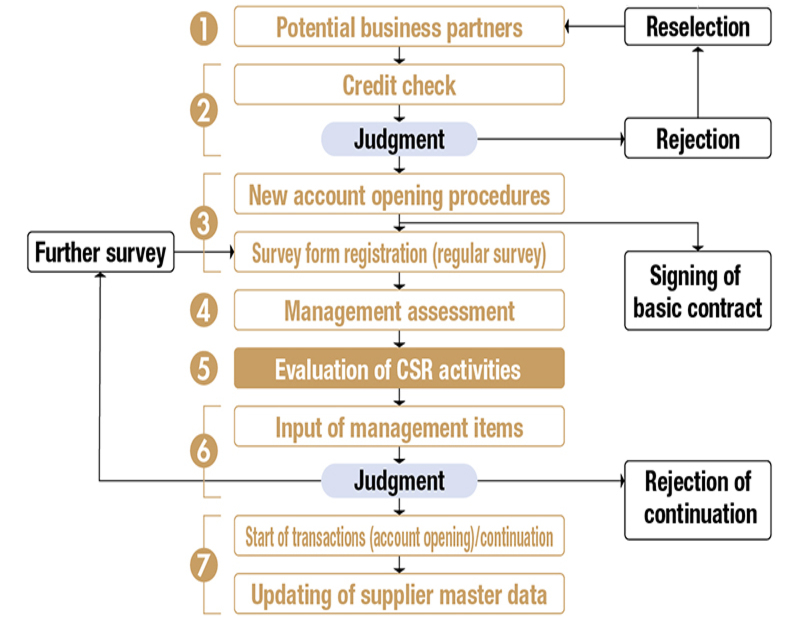

CSR/Results of Sustainable Procurement Activities
Main activities in fiscal 2024
Continued promotion of procurement activities with an emphasis on CSR
In order to work with our business partners to create a sustainable society, we have been providing ongoing CSR education to members of our materials procurement department to raise their awareness and knowledge, and have put in place systems and mechanisms for putting this into practice.
Starting in fiscal 2024, we will begin developing requirements and risk assessments from a business perspective, promoting specific initiatives aimed at sustainability throughout the supply chain, and working to spread and strengthen these initiatives to group companies.
1. Policy distribution
We created a video in which our executive in charge explains our CSR/sustainable procurement policy and requests that our business partners take action based on the priority issues of corporate ethics, respect for human rights, creating a safe working environment, and efforts to reduce environmental impact, mainly by reducing greenhouse gas emissions. At the beginning of fiscal 2024, we distributed this video to our main domestic business partners, which account for approximately 70% of our business volume.
(In June 2025, we issued a revised version of our "Request to Business Partners," which we had previously distributed to all business partners prior to conducting business, to reflect the addition of "conflict minerals" and "chemical substance management," which are key issues we have strengthened. We have made it clear that business transactions are premised on compliance with this content, and are currently implementing this.)
2. "Partnership Building Declaration"
The "Partnership Building Declaration" was also explained in the video shown in Section 1, "Policy Deployment," and in particular, we made a promise to hold a forum for discussion on "price negotiations for appropriate transfer of labor costs" and reached out to them.
3. CSR Education
We conducted e-learning aimed at employees in procurement-related departments, including those at domestic Group companies, with the aim of instilling CSR education. 846 employees completed the course (participation rate: 92.7%), including 421 employees at our company (excluding Group companies) who completed the course (participation rate: 93.6%).
4. Educational activities
In fiscal 2024, we added content on "rejecting anti-social forces" to the "CSR/sustainable procurement" message on the digital bulletin board for all employees, and also revised the content posted regarding the Subcontract Act.
5. Risk Assessment/CSR Procurement Questionnaire
We conducted a questionnaire survey based on the ShinMaywa CSR Procurement Guidelines targeting domestic suppliers that account for the top 50% of our transaction volume in fiscal 2023. The survey asked about the status of initiatives related to the environment, human rights, labor, and economy (corporate governance), and by analyzing the responses, we are reflecting any necessary information in our future initiatives.
6. Strengthening efforts regarding "conflict minerals" and "chemical substance management"
In our business efforts, the urgency of "conflict minerals" and "chemical substance management" has increased in terms of human rights and the environment, respectively. With regard to "conflict minerals," we have invigorated our efforts by establishing a "Conflict Minerals Procurement Policy," and with the cooperation of our business partners, we aim to achieve responsible procurement of conflict minerals.
Regarding "conflict minerals," we support the international responsible minerals initiative RMI (Responsible Minerals Initiative) and conduct surveys using the CMRT (Conflict Minerals Reporting Template), a standardized template for investigating supply chains.
As of the end of fiscal year 2024, 57.4% of our business partners deemed to be subject to the CMRT survey have responded to the survey, and we are continuing to work towards achieving 100% compliance.
Regarding "chemical substance management," we are reaffirming and revitalizing our systems to respond to requests from the supply chain, such as the EU RoHS Directive and REACH regulations, and with the cooperation of our business partners, we aim to procure materials with a low environmental impact.
Main activities in FY2023
Continued promotion of procurement activities with an emphasis on CSR
In order to work toward a sustainable society together with our business partners, we have been providing ongoing CSR education to members of our material procurement department to raise their awareness and knowledge.
In fiscal 2023, we will continue to provide CSR education in response to changes in society, while gradually putting in place a system to finally fully implement sustainable procurement practices.
1. Policy distribution
The second edition of the ShinMaywa CSR Procurement Guidelines, published on our website on October 1, 2023, added content that was lacking in terms of putting the guidelines into practice.
2. "Partnership Building Declaration"
On March 22, 2023, we also made the "Partnership Building Declaration," which is promoted by the Japanese government and requires business operators to make a declaration in the name of a person with representative authority from the perspective of the "ordering party," with the aim of increasing added value throughout the entire supply chain and achieving coexistence and prosperity between large and small corporations.
3. CSR Education
It is important that those in charge of procurement who have contact with suppliers deepen their understanding of "CSR/Sustainable Procurement" and act accordingly.
We have established a website dedicated to materials procurement/CSR/Sustainable Procurement on our internal portal site and created an environment that facilitates the sharing of information within the company, including educational videos reflecting the contents of the 2nd edition of "ShinMaywa CSR Procurement Guidelines".
4. Educational activities
In FY2023, we will continue to post messages on "CSR (Corporate Social Responsibility)/Sustainable Procurement" on the digital bulletin board for all employees.
In fiscal 2023, we have added content on the risk of encouraging human rights violations.
5. Launch of supplier portal site
We decided to open the ShinMaywa Supplier Portal Site with the aim of improving mutual productivity in the future through smooth communication with suppliers, information sharing, and mutual use of data, and have initially requested 110 companies, which account for approximately half of our total material transactions, to register on our supplier portal site.
For the time being, we plan to conduct a trial run of the system limited to companies that have requested to register, and after incorporating feedback and making improvements, we will roll it out to all material suppliers.
As a first step in sharing information, we are sharing links to related information and making available to a limited extent our in-house CSR/sustainable procurement education and awareness-raising materials, which we hope will be useful in training registered companies on CSR procurement.
Main activities in FY2022
Continued promotion of procurement activities with an emphasis on CSR
1. Policy distribution
We have distributed the ShinMaywa CSR Procurement Guidelines, which were published on our website on April 1, 2022, to major business partners in each business division and asked for their cooperation in promoting CSR/sustainable procurement.
2. CSR education
In addition to training for representatives of procurement departments in each business division, we have also provided individual training for personnel in charge of procurement departments in each business division.
It is important for procurement personnel who interact with suppliers to deepen their understanding of "CSR/Sustainable Procurement" and act accordingly.
All 108 members of the procurement departments of each division took part in the video-based training on "CSR/Sustainable Procurement" created by the Materials Procurement Department of the Corporate Planning Headquarters at the head Head Office.
From the students,
“I learned that it is important to be conscious of the value chain.”
"I was able to understand to some extent the relationship between CSR activities and SDGs."
"I thought it was difficult to have to think about the future, such as the environment. I want to find out what I can do and take action."
While receiving feedback such as,
"If you have a collection of explanations of abbreviations, your understanding will be deeper."
"The videos are long and it's difficult to find time to watch them, so it would be easier to watch if they were broken up into smaller chunks."
"The robot voice has no intonation, and I can't understand the content."
We received many opinions that will be useful for improving future educational materials and methods, so we will reflect them in repeated education from 2023 onwards.
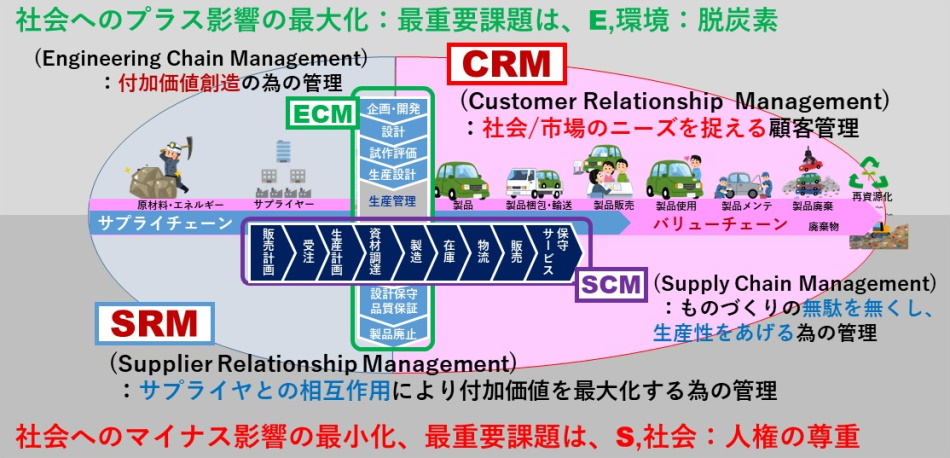
(Reference: Some of the educational materials)
3. Awareness raising
In FY2022 as well, we posted messages on “Corporate Social Responsibility (CSR)/Sustainable Procurement” on the digital bulletin board for all employees.
- (Example of posted content)
-
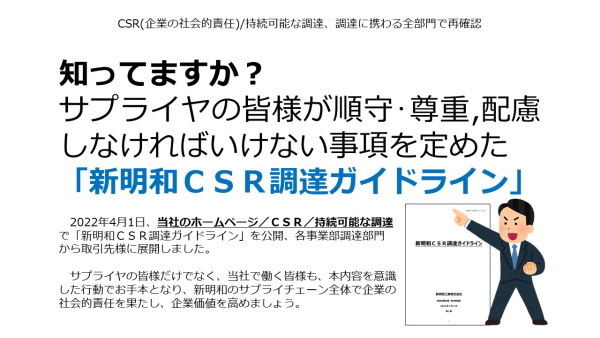
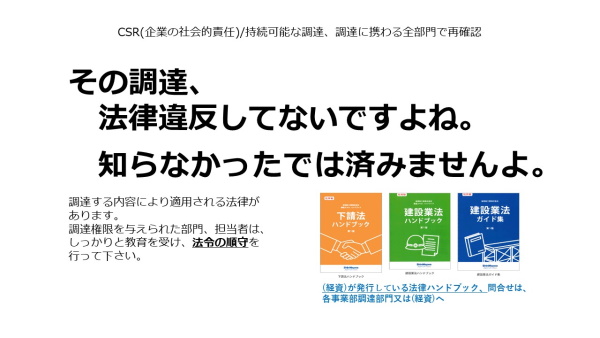
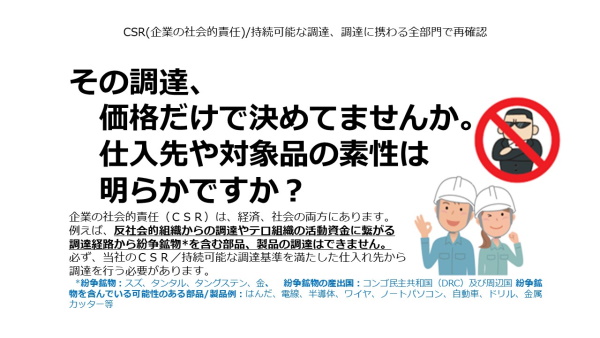
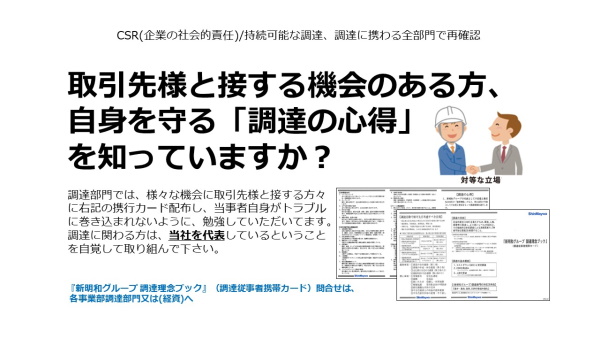
4. Issuance of buyer education materials and handbooks
In order to enhance skills of persons in charge of procurement, we created various manufacturing knowledge handbooks to boost manufacturing knowledge required for quotation and assessment as well as price negotiations, and a trade practice handbook to accurately manage import and export, respectively, and have distributed them to procurement departments of each business division.
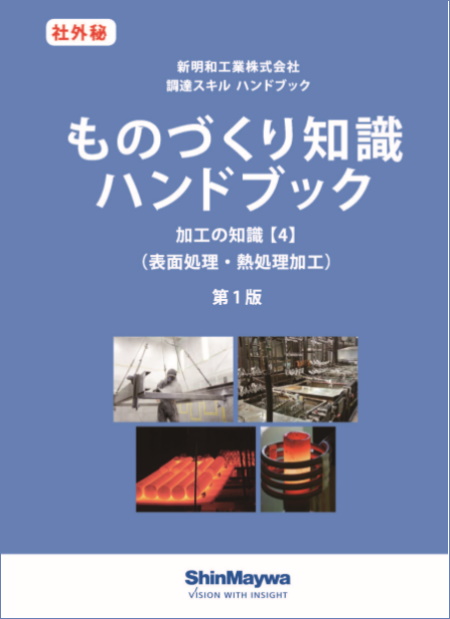
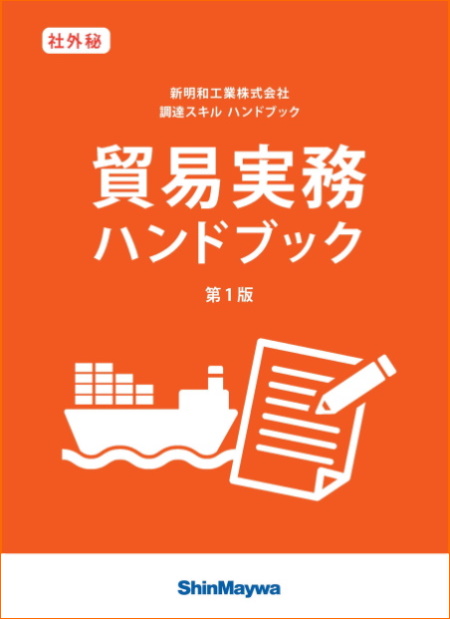
Main activities in FY2021
1. In-house training held for procurement departments at business divisions
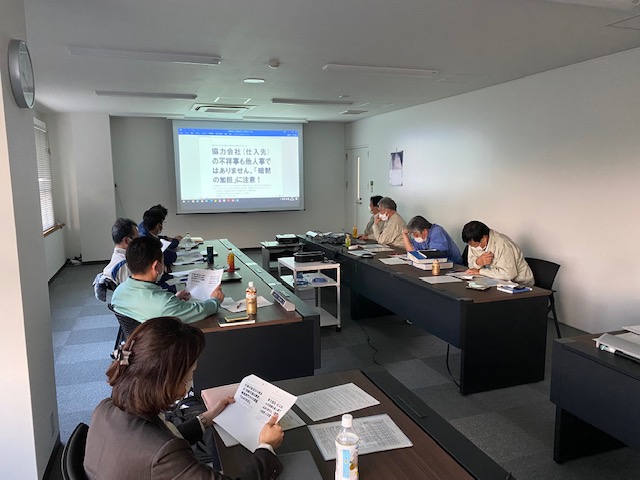
At a regular company-wide procurement department meeting, we conducted in-house training on CSR/sustainable procurement for representatives of business division procurement departments. (December 2021)
We raised awareness of human rights and environmental issues in the supply chain, and reconfirmed and shared the role, current status, and future plans of the procurement department toward realizing "CSR/sustainable procurement." We aim to realize a sustainable society step by step together with our suppliers, through initiatives tailored to the urgency of CSR/sustainable procurement in each business division and industry.
2. Awareness raising
We posted messages titled “Corporate Social Responsibility (CSR)/Sustainable Procurement” on the digital bulletin board for all employees. The contents were decided at the Company-wide regular meeting of procurement departments and was updated on a weekly basis during March 2022.
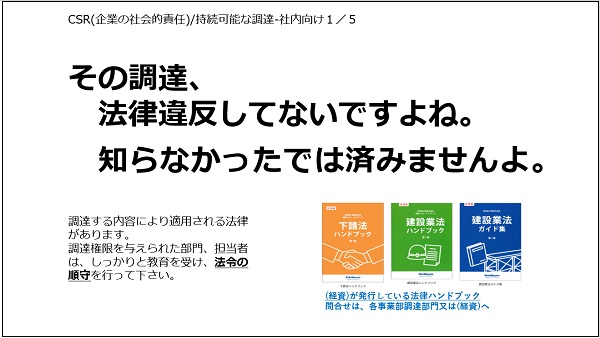
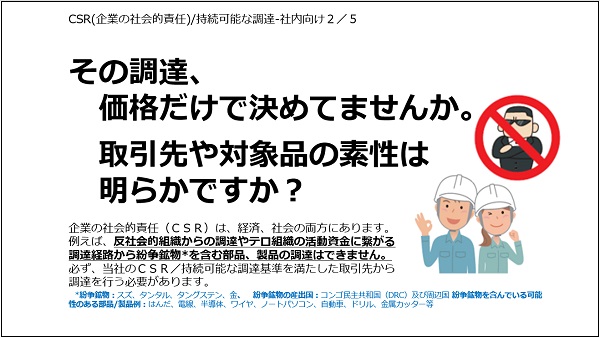
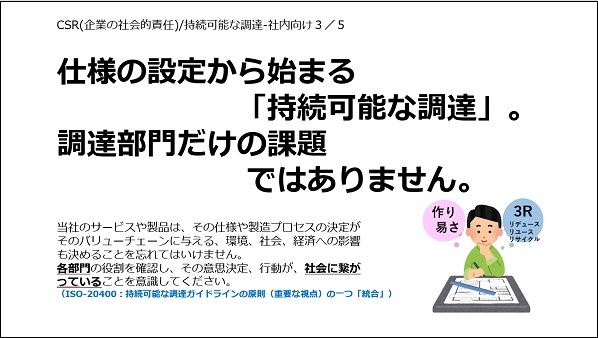
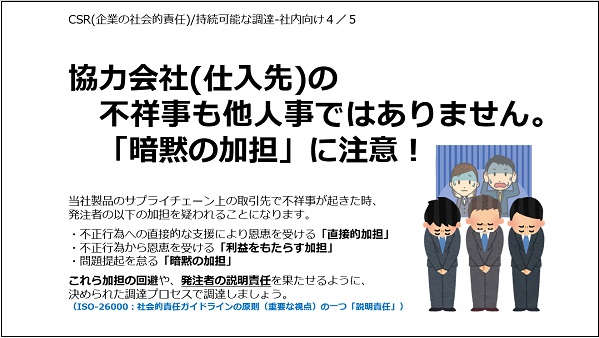
3.Formulation of procurement guidelines
We have established "ShinMaywa CSR Procurement Guidelines" to promote CSR/Sustainable Procurement step by step with our suppliers.
We have compiled the "CSR/Sustainable Procurement Standards," which are the minimum mandatory rules to be met by suppliers of various sizes and in various regions, and the items that must be complied with, respected, and considered as "what they should be" in order to ask suppliers to be more specific, into the "ShinMaywa CSR Procurement Guidelines". The "CSR/Sustainable Procurement Standards" are summarized in the "CSR Procurement Guideline".
The "Criteria" indicate the minimum requirements that we consider necessary in connecting our supply chain, such as actions with an awareness of sustainability as a party to society, organizational efforts to encourage such actions, and implementation of risk management.
We will review the "Standards" according to the degree of social impact of each of our businesses and social changes in each region, so we ask our suppliers to implement initiatives toward the shared "ideal state," and together, step by step, pursue sustainability and raise the bar to improve our products and services and, through them, achieve the goals of CSR and corporate social responsibility throughout the supply chain. We would like to fulfill our CSR and corporate social responsibility throughout the entire supply chain by pursuing and raising the level of sustainability together, step by step.
We would like to ask our suppliers to keep the "Guidelines" in mind, increase their sensitivity to society, and help us realize our CSR and sustainable procurement through risk management, starting from the prioritized items and working up from there.
Main activities before 2020
1. Revision of the “Basic Transaction Agreement”
We have revised our "Basic Transaction Agreement" in accordance with amendments to the Civil Code and the Personal Information Protection Act (April 2020).
2. Response to the new coronavirus
Regarding the prevention of the spread of COVID-19, based on the materials distributed within the company, such as guidelines for our employees,
we have created the following reference template for suppliers, hoping that it will be of some help to you. (April 2020)
"Employee Guidelines for Preventing the Spread of COVID-19 Infection"
"COVID-19 Health Observation Checklist (for home checks)"
3. Revision of “Procurement Worker Mobile Card”
In order to achieve CSR/sustainable procurement, as part of the education of procurement workers within the group, we reviewed the "procurement worker mobile card" that describes procurement guidelines, etc., and distributed it to procurement workers throughout the company. We also created and developed an explanatory video. (February 2021)
- “ShinMaywa Group Procurement Philosophy Book” (portable card for procurement personnel) *Fold in three and carry
-
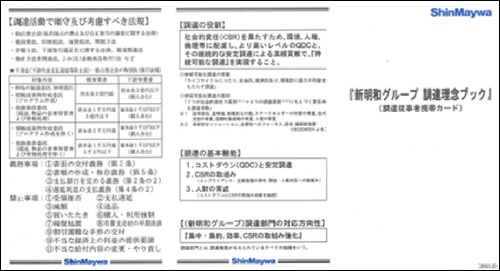
(front) 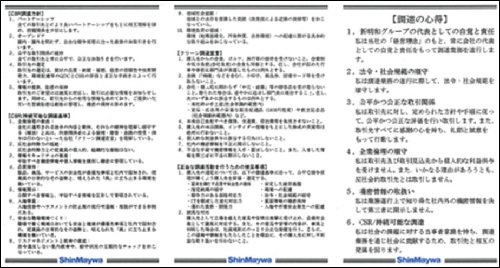
(back)
4. Request for understanding and cooperation in clean procurement declaration, environmental activities, CSR procurement, and green procurement
In addition to distributing the document ``Clean Procurement Declaration, Request for Cooperation in environmental Activities, etc.'', we request understanding and cooperation in CSR procurement and green procurement every year during business policy briefing sessions at each business site and individual visits to suppliers. doing.
5. Promote renewal of procurement to new basic transaction contract
6. Review the guidelines for procurement operations audits, implement procurement operations audits including group companies, and improve the spiral.
7. Promote CSR procurement evaluation of business partners (understanding and further improvement of initiatives) and appropriate procedures for business partner selection
- Compliance
- envrionment, safety and health, labor and human rights
- Information Security
8. Promote efforts to improve transaction conditions for small and medium-sized enterprises such as subcontractors based on the Ministry of Economy, Trade and Industry notification
9. Promote activities to comply with the Subcontract Act (updated the Subcontract Act handbook due to increased employee awareness)
10. Promoting activities to comply with construction industry laws (updating the construction industry law handbook and guide collection due to increased employee awareness)
11. Issuance of buyer education materials/handbooks
Education for procurement staff (manufacturing), which summarizes the processing knowledge necessary for carrying out procurement work in an easy-to-understand way, as a guide for selecting suppliers, negotiating delivery dates, considering countermeasures in the event of quality problems, etc. (Create and distribute “Knowledge Handbook”)
